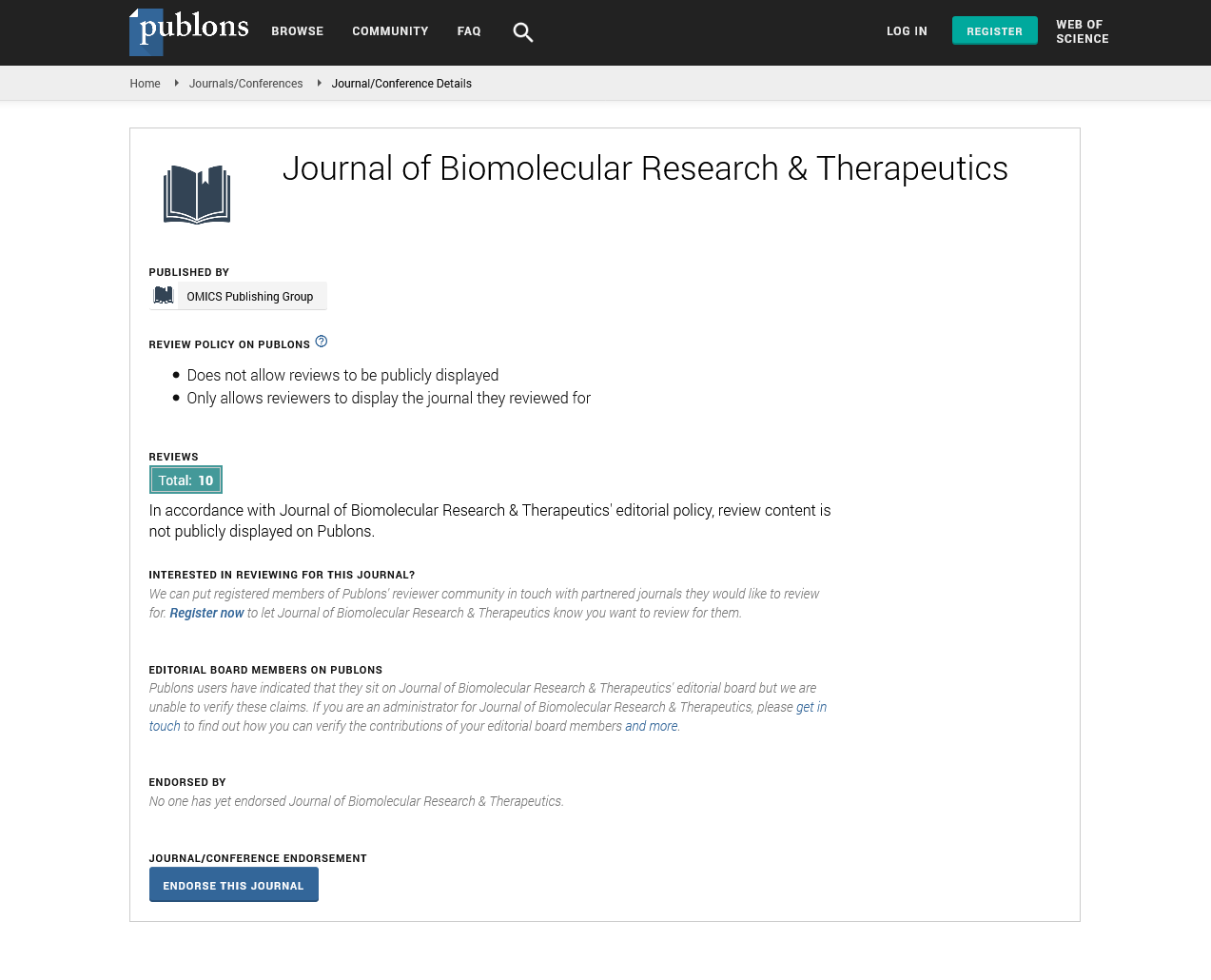Indexed In
- Open J Gate
- Genamics JournalSeek
- ResearchBible
- Electronic Journals Library
- RefSeek
- Hamdard University
- EBSCO A-Z
- OCLC- WorldCat
- SWB online catalog
- Virtual Library of Biology (vifabio)
- Publons
- Euro Pub
- Google Scholar
Useful Links
Share This Page
Journal Flyer

Open Access Journals
- Agri and Aquaculture
- Biochemistry
- Bioinformatics & Systems Biology
- Business & Management
- Chemistry
- Clinical Sciences
- Engineering
- Food & Nutrition
- General Science
- Genetics & Molecular Biology
- Immunology & Microbiology
- Medical Sciences
- Neuroscience & Psychology
- Nursing & Health Care
- Pharmaceutical Sciences
Brief Report - (2021) Volume 10, Issue 8
Brief Report on Polymerase Chain Response
Daniele P*Received: 18-Aug-2021 Published: 30-Aug-2021, DOI: 10.35248/2167-7956.21.10.172
Brief Report
Polymerase chain response (PCR) is an innovation for dramatic enhancement of a part of DNA. The constraint of its affectability is a solitary atom, making PCR a brilliant subjective instrument for the particular location of uncommon DNA arrangements. Under appropriate conditions, the yield of intensified DNA is corresponding to the underlying number of target particles, delivering it a quantitative insightful device also. PCR has advanced into an array of differed approaches generally utilized in fundamental organic examination, biotechnology, clinical exploration, clinical diagnostics, crime scene investigation, food innovation, ecological testing, antiquarianism and human sciences, and different fields. Despite the fact that other nucleic corrosive enhancement advancements have been depicted, PCR stays by a long shot the most broadly utilized.
The polymerase chain response (PCR) is utilized to make a huge number of duplicates of an objective piece of DNA. It is an essential apparatus in current atomic science and has changed logical examination and demonstrative medication. PCR and its varieties have a wide scope of specific applications and are utilized by researchers in all fields of science. The outcomes are additionally utilized by researchers in numerous different fields.
Polymerase chain response (PCR) is a typical atomic science strategy that empowers analysts to make numerous duplicates of a particular locale of DNA. PCR is proficient, fast and can enhance DNA or RNA successions from different sources. When the DNA has been adequately intensified, the subsequent item can be sequenced, broke down by gel electrophoresis, or cloned into a plasmid for test purposes.
Polymerase chain response (PCR) is a strategy broadly used to quickly make millions to billions of duplicates (complete duplicates or incomplete duplicates) of a particular DNA test, permitting researchers to take a tiny example of DNA and intensify it (or a piece of it) to an enormous enough add up to concentrate exhaustively. It is essential to large numbers of the methods utilized in hereditary testing and exploration, including examination of old examples of DNA and distinguishing proof of irresistible specialists. Utilizing PCR duplicates of tiny measures of DNA successions are dramatically intensified in a progression of patterns of temperature changes. PCR is presently a typical and regularly irreplaceable method utilized in clinical lab research for a wide assortment of utilizations including biomedical exploration and criminal criminology.
Central issues:
• Polymerase chain response, or PCR, is a procedure to make many duplicates of a particular DNA district in vitro (in a test tube as opposed to a creature).
• PCR depends on a thermostable DNA polymerase, Taq polymerase, and requires DNA preliminaries planned explicitly for the DNA area of interest.
• In PCR, the response is over and over pushed through a progression of temperature changes, which permit many duplicates of the objective district to be created.
• PCR has many examination and reasonable applications. It is regularly utilized in DNA cloning, clinical diagnostics, and legal investigation of DNA.
Polymerase chain response (PCR) is a typical research facility strategy used to make many duplicates of a specific locale of DNA. This DNA locale can be anything the experimenter is keen on. For instance, it very well may be a quality whose work a specialist needs to comprehend, or a hereditary marker utilized by measurable researchers to coordinate with crime location DNA with suspects.
Ordinarily, the objective of PCR is to make enough of the objective DNA district that it very well may be examined or utilized in another manner. For example, DNA intensified by PCR might be sent for sequencing, envisioned by gel electrophoresis, or cloned into a plasmid for additional examinations. PCR is utilized in numerous spaces of science and medication, including sub-atomic science research, clinical diagnostics, and surprisingly a few parts of environment.
Citation: Daniele P (2021) Brief Report on Polymerase Chain Response. J Biomol Res Ther. 10: 172.
Copyright: © 2021 Daniele P. This is an open-access article distributed under the terms of the Creative Commons Attribution License, which permits unrestricted use, distribution, and reproduction in any medium, provided the original author and source are credited.

